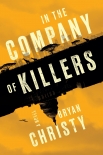In the Company of Killers by Bryan Christy (detective books to read .txt) 📗

- Author: Bryan Christy
Book online «In the Company of Killers by Bryan Christy (detective books to read .txt) 📗». Author Bryan Christy
Botha gathered up their orange peels and wiped the table with a napkin. He dropped the remnants into a wastebasket and clapped his hands clean. “I got you switched to my old cell. Left you a few items. Maybe next time we meet, you can tell me which one you’re going to be.”
“Which one?”
“The hunter, the buffalo, or the boy.” Botha grinned.
UNARMED IN THE COMPANY OF KILLERS
Kgosi Mampuru II Management Area
Pretoria, South Africa
Thabo escorted Klay down a long pale hall to Botha’s former cell, a battleship gray, steel-doored isolation unit in the prison’s C-Max unit. “Used to hang us on the other side there,” Thabo said, nodding toward the cell block’s opposite end. He handed Klay a cloth laundry sack. “From Ras.”
Botha’s cell smelled of Pine-Sol. Against one wall was a single bed bolted to the floor. On it was a folded wool blanket, a set of sheets, and a clean pillow. Against the opposite wall was a metal desk with a big screen television on top of it. A cable ran from the TV through a small hole in the concrete wall. The toilet was in the back, blocked from view by a metal dresser.
On the walls hung several Playboy centerfolds and a poster of Sylvester Stallone as Rambo. There were blank spaces and bits of old tape on the walls where someone had recently removed small photographs. On top of the desk was an unopened bottle of Courvoisier XO and a glass.
Klay sat down on the bed and fished through Botha’s gift bag. Some toiletries, a laptop, and a note. Klay set the laptop beside him on the bed and read the note. “Research, counselor. Nobody bothers you less I say. Do what you do. Enjoy the conyac. —Ras.” The note included the warden’s Wi-Fi password.
Klay set the sack on the floor and lay back on the bed. He put his arm over his eyes to block the fluorescent bulb. After a moment the scenes began. Sehlalo’s ankle pistol in his hand, the disbelief on Tenchant’s face. Then Hungry, blood-smeared, kneeling beside her fiancé’s body, folding the blue windbreaker into a pillow and placing it gently under Sehlalo’s head. He watched her wipe the blood from his face, straighten his collar, and adjust his arms and legs. She crawled to Miss Minnie and did the same for her, and then to Miss Edna doing what she could to give the dead their dignity.
He’d watched people tend to corpses thousands of times. They straightened eyeglasses, fixed neckties, picked away bits of makeup, adjusted stray hair. They leaned into caskets and kissed the dead on the forehead, the cheeks, the lips. They spoke to them.
Klay had seen so many dead he couldn’t remember his first, but he didn’t understand it. A corpse was not a person. It was a thing—an abandoned thing, no more worthy of sentiment than was a dead person’s shoes or toothbrush. His view formed on the morning of his mother’s funeral. “This is life, Tom,” his father had explained, standing in the doorway to their funeral home’s main chapel before approaching her. “And this is death.” Jack Klay switched off the light and darkness filled the room. “Death is always present, but death is afraid of the light.” His father switched the light back on. “Your mother was a light.” He squeezed Klay’s hand. “You are a light, Tom. But when a light is switched off, the world is back to its natural state. Do you understand?”
Klay said he did. He took from the lesson a message his father had not intended: if the fundamental state of the world is darkness, it is foolish to grieve. He did not want to be foolish. His mother wouldn’t like that. And so to honor her he swore he would not cry at her funeral. He would not mourn her, or anyone. It wasn’t easy to do. He trembled beside her closed casket, knotting his toes in his shoes and squeezing his stomach muscles. He bit his tongue so hard it bled. From then on he practiced. He said goodbye to his first dog, Shelby, with some tears, but to the next, Brutus, and to two cats without any at all. He was dry-eyed as he pulled socks up over the dead feet of Julie, his motorcycle-riding neighbor, whom he’d had a crush on. He was emotionless holding his grandmother’s fluffy-haired head with one hand while he repositioned her plastic head block with the other. He was steady as he embalmed Little Victor from the neighborhood.
Without realizing it, his definition of darkness expanded over the years so that it wasn’t just grief over a lost life he silenced. He found ways to switch off his feelings for all sorts of things that might end: friendships, loves, dreams. Over time, his idea of what constituted an end expanded, too. He learned to protect himself not just from the prospect of grieving, but from any loss, any pain. He began pulling the plug on possibilities earlier and earlier, shutting himself off from everything he might care deeply about before it had a chance to hurt him by dying in front of him—the way his mother had.
Now, lying in a prison cell, exhausted and alone, an unbearable wave of pain broke over him, and he asked himself for the first time what the opposite of his light-switch philosophy might be. He pressed his fists against his eyes. He could not stop their faces. His mother walking past him, his father on the drive to prison, the boy and his bicycle





Comments (0)